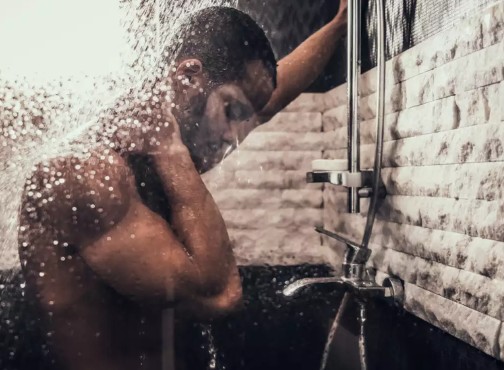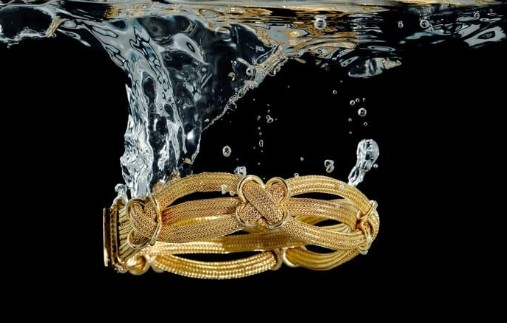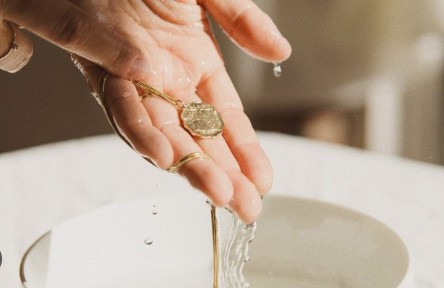Taking off your jewelry every time you want to shower can get tiresome; you can even easily forget to remove it. However, water isn’t friendly to all materials, so can you shower with 14k gold?
You can shower with 14k gold but don’t make it a regular habit. While 14k gold is a durable and relatively strong metal, it is not immune to damage or wear over time. Water, soap, and shampoo can all contribute to your jewelry’s wear.
Considering the value and beauty of gold jewelry, caring for yours should be a priority. So, let’s explore the safety of 14k gold in the shower and how to care for your precious pieces.

Can You Shower With 14k Gold? (14k Gold Explained!)
Before diving into the specifics of showering with 14k gold, you ought to understand what 14k gold is and how it differs from other gold alloys.
14k gold features 58.3% pure gold (also known as 24k gold) and 41.7% other metals, typically silver, copper, or zinc. These additional metals are mixed with pure gold for better durability and strength.
The result is a beautiful, lustrous, and relatively durable gold alloy commonly used in jewelry making. The “14k” designation refers to its gold purity, measured in karats.
To understand 14k gold, let’s compare it with pure gold (24k).
- Pure Gold (24k)
Pure gold is 100% gold without alloying metals. It is exceptionally soft and malleable, making it unsuitable for most jewelry, as it can easily scratch, bend, or deform.
- 14k Gold
As mentioned above, 14k gold is composed of 58.3% pure gold and 41.7% other metals, typically copper, silver, or zinc. 14k gold is known for its balance between purity and durability, making it popular for jewelry, including rings, necklaces, earrings, and bracelets.
What You Should Know Before Showering With 14k Gold
While it is common practice for people to shower with 14k gold, it’s essential to consider various factors to ensure the longevity and appearance of your precious pieces. Keep these key factors in mind before showering with 14k gold:
1. Alloy Composition
Understand the specific composition of your 14k gold jewelry. The choice of alloying metals primarily affects the color and durability of the gold; some variations may be more resistant to tarnishing or corrosion than others.
2. Type of Jewelry
Different types of jewelry are more or less suitable for showering. For instance, rings and earrings can be less exposed to water and chemicals during a shower compared to necklaces or bracelets. Therefore, consider the type of 14k gold jewelry and its reaction to water exposure.
3. Frequency of Exposure
How often you shower with your 14k gold jewelry matters. Frequent exposure to moisture and soap can accelerate tarnishing and wear, so if you do it regularly, be prepared for more maintenance.
4. Water Quality
The quality of your shower water can impact your 14k gold jewelry. Hard water (it contains minerals, primarily ions of calcium and magnesium) can leave mineral deposits on the metal, affecting its appearance.
These mineral deposits, often referred to as “scale” or “limescale,” can dull the shine and appearance of the gold. Therefore, it’s imperative to rinse and dry your jewelry thoroughly after each shower if you have hard water.
5. Soap and Shampoo
Pay attention to the shower products you use. Some soaps and shampoos contain harsh chemicals that can react with the alloying metals in your gold jewelry, causing tarnishing or discoloration.
For example, sulfur-containing compounds found in some shampoos can tarnish the gold. Tarnishing manifests as a dull, discolored layer on the gold jewelry’s surface.
Moreover, soap and shampoo can leave residue on your jewelry after showering. Over time, this residue can accumulate, making your gold jewelry appear less lustrous and clean, contributing to tarnishing.
6. Chlorine Exposure
If you have a swimming pool with chlorinated water or regularly visit one, be cautious with your 14k gold jewelry. Chlorine can be particularly harmful to gold alloys, leading to discoloration and weakening of the metal.
Chlorine can also accelerate the tarnishing of 14k gold jewelry, especially if the alloy contains copper. Tarnishing can result in a dull and discolored appearance.
7. Temperature Fluctuations
Frequent changes in temperature, such as hot showers followed by cold water, can stress your jewelry, causing it to weaken over time. Sudden temperature changes can also affect the expansion and contraction of the metal, leading to structural issues.
While expansion and contraction due to cold and heat are minimal in gold, frequent and extreme temperature fluctuations can, over time, contribute to structural issues in jewelry. This is especially true if the jewelry contains delicate components like gemstones or intricate designs.
In addition, if your 14k gold jewelry has soldered components, such as links in a chain or prongs holding gemstones, extreme temperature changes can weaken these soldered joints. This weakening may eventually lead to damage or disconnection of parts.
8. Maintenance
You will need to frequently clean and maintain your 14k gold jewelry to keep it looking its best if you regularly shower with it. This includes removing soap residue and tarnish through regular cleaning, as well as drying it thoroughly after each shower.
9. Protective Coatings
Some jewelers offer protective coatings, such as rhodium plating, for gold jewelry. These coatings give an extra protection layer against tarnishing and help your jewelry maintain its shine.
Consider whether a protection coating suits your pieces.
10. Personal Preference
Ultimately, the decision to shower with 14k gold jewelry comes down to personal preference. Some people prefer to remove their jewelry before showering to minimize exposure to water and chemicals, while others choose to wear it without issue.
Consider how much convenience and comfort factor into your decision.

How Fast Does 14k Gold Tarnish?
14k gold jewelry is relatively resistant to tarnishing compared to other metals like silver, but it can still deteriorate over time, particularly if you don’t care for it properly. The rate at which 14k gold tarnishes depends on several factors, including the specific alloy used, your body chemistry, care and maintenance, and exposure to chemicals.
Contact with cleaning products, lotions, perfumes, and other chemicals can accelerate tarnishing. The acidity of your skin can also impact tarnishing, more acidic skin, which can cause jewelry to tarnish more quickly when in contact with their skin.
Furthermore, properly caring for and cleaning your 14k gold jewelry can help slow tarnishing. In addition, high humidity, pollution, and exposure to sulfur-containing compounds in the air can contribute to tarnishing.
Can You Wear 14k Gold Plated In The Shower?
Wearing 14k gold-plated jewelry in the shower is generally not recommended. While 14k gold plating can provide a beautiful and affordable option for jewelry, it is not as durable as solid gold.
Exposing gold-plated jewelry to water, especially in the shower, can lead to the following issues:
- Fading: Water and soap contact can cause gold plating to wear off quickly. Over time, your jewelry will lose its gold appearance.
- Tarnishing: Gold-plated jewelry can tarnish when exposed to moisture and humidity, leading to a dull or discolored appearance.
- Corrosion: Water can also lead to corrosion of the underlying base metal, further damaging the plating and the jewelry itself.
- Loosening of Stones: If the jewelry contains gemstones or other embellishments, exposure to water can weaken the adhesives used to secure them, potentially causing them to come loose.
Can You Wear 14K Gold In The Ocean?
You can put on 14K gold pieces in the ocean. However, understand that exposing your gold jewelry to salt water and the chemicals often found in seawater can potentially damage it over time.
However, you should still exercise caution and take some precautions when wearing gold jewelry in the ocean:
a. Securely Fasten Jewelry
Ensure your jewelry is securely fastened and won’t easily come off while swimming or playing in the water. This will help prevent accidental loss.
b. Rinse Afterward
After exposure to saltwater, rinse your gold jewelry with freshwater to remove any salt residue. This helps maintain the jewelry’s shine and prevent any potential long-term damage.
c. Avoid Harsh Activities
While gold is durable, it’s not impervious to damage. Therefore, avoid engaging in activities like surfing or vigorous water sports while wearing delicate gold jewelry, as these activities can increase the risk of damage or loss.
d. Check for Loose Stones
If your gold jewelry contains gemstones, periodically check to ensure that the settings are secure. Saltwater and the motion of the ocean can sometimes loosen stones in their settings.

Tips for Showering with 14k Gold Jewelry
Take these precautions while showering with gold jewelry to preserve its beauty and extend its lifespan.
i) Remove Your Jewelry
The safest way to protect your 14k gold jewelry from water and chemicals is to remove it before showering. This ensures no moisture or soap residue touches your precious pieces.
ii) Use a Jewelry Dish
If you prefer not to remove your jewelry, keep your pieces in a small dish or container while showering.
iii) Rinse Thoroughly
If your jewelry accidentally gets wet, rinse it thoroughly with clean water after your shower to remove soap and chemical residues that may cause tarnishing.
iv) Dry Gently
After rinsing, pat your jewelry dry using a clean, smooth cloth. Avoid abrasive materials since they can scratch the metal. In addition, ensure your jewelry is fully dry prior to storing it.
v) Regular Cleaning
Periodically clean your 14k gold jewelry with a jewelry-specific cleaning solution or a mild soap and warm water mixture. Scrub away any built-up dirt or tarnish with a soft cloth or brush, then rinse and dry jewelry thoroughly.
vi) Consider Protective Coatings
Give your 14k gold an extra layer of protection against tarnishing and help your jewelry maintain its shine with a protective coating, such as rhodium plating.
Summary of Can You Shower With 14k Gold?
Showering with 14k gold may not be ideal, particularly if you make it a habit. However, you can get away with it without causing damage to your jewelry if you do it occasionally and take proper care and precautions. Be mindful of the potential risks, such as exposure to water, soap, and other chemicals, and take steps to minimize them.
Also, Read:
